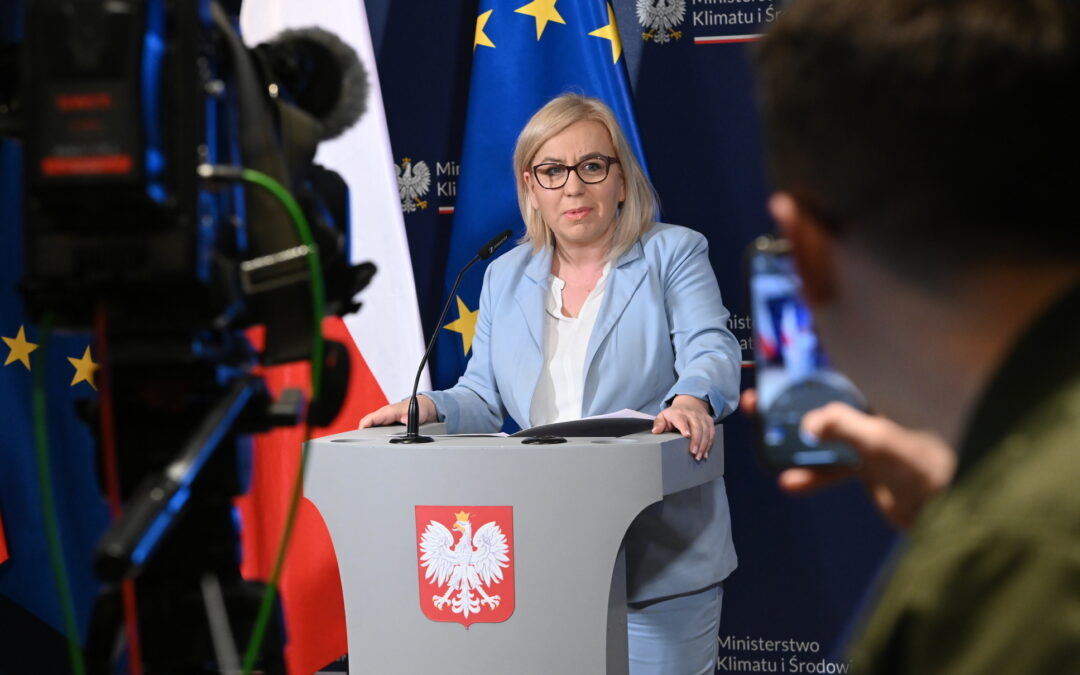Keep our news free from ads and paywalls by making a donation to support our work!

Notes from Poland is run by a small editorial team and is published by an independent, non-profit foundation that is funded through donations from our readers. We cannot do what we do without your support.
Poland’s government says it will not support a newly proposed European Union target for cutting emissions, which it calls “unrealistic and unacceptable”.
On Wednesday, the European Commission announced a proposal to amend the EU Climate Law to include a 2040 target of cutting greenhouse gas emissions by 90% compared to their level in 1990.
Currently, the bloc has a target of 55% cuts by 2030, which the commission says it is “well on track” to achieve. The aim is then to achieve net-zero emissions by 2050.
We stand firmly by our commitment to decarbonise European economy by 2050.
Today we propose a new way to get to 2040: the EU's Climate Law. It will give certainty to investors, innovation, strengthen industrial leadership and increase energy security.https://t.co/oKxHXFZmhH pic.twitter.com/UgpB7063Na
— European Commission in Cyprus (@EUCYPRUS) July 2, 2025
In response to the new proposal, climate minister Paulina Hennig-Kloska told Polsat News that “Poland will not support the climate goal for 2040 as proposed by the European Commission” because “our country is not yet ready to implement such ambitious plans”.
The minister emphasised that the government supports having “more renewables in the energy mix” and “this is the direction we are heading in”. But she added that “eliminating emissions is not only about energy, it is also about transport, industry, agriculture… and as a country we are not ready”.
She said that Poland “expects greater flexibility” from Brussels. “The EU’s reduction target must be realistic, and the contributions of individual countries toward achieving it must be varied.“
💬 Polska nie poprze celu klimatycznego na rok 2040 w formie zaproponowanej przez Komisję Europejską. Nasz kraj nie jest jeszcze gotowy na realizację tak ambitnych założeń. To jest wiadome Komisji Europejskiej. Moim zdaniem, obecnie nie ma również wystarczającego poparcia dla… pic.twitter.com/cESmZbsyrB
— Ministerstwo Klimatu i Środowiska (@MKiS_GOV_PL) July 2, 2025
Government spokesman Adam Szłapka echoed her remarks, calling the proposed climate target “unrealistic and unacceptable” in a post on social media.
Poland’s right-wing opposition was also strongly critical of the proposal, with MEP Michał Dworczyk, an MEP for the national-conservative Law and Justice (PiS) party, saying it would “result in unimaginable costs, amounting to trillions of zloty for Poles”.
Dworczyk also accused figures from Poland’s main ruling party, the centrist Civic Platform (PO), of “lying” during the recent presidential election campaign when they claimed that the EU’s flagship climate policy, the Green Deal, was no longer a threat to Poland.
The European Commission’s proposal will still be subject to negotiations between member states and within the European Parliament. Poland will seek to build a coalition of countries to block or soften the target, reports the Dziennik Gazeta Prawna (DGP) daily.
Warsaw reportedly regarded France as a potential ally, after President Emmanuel Macron last week spoke publicly in favour of delaying discussions over the 2040 targets. Hungary is another opponent of the plans.
The current proposal already includes some elements intended to soften the blow for countries such as Poland, including so-called international credits – such as planting trees or protecting forests elsewhere – that can shift some decarbonisation away from domestic sectors.
However, the scope of such measures is currently “very modest”, writes DGP, covering only three percentage points out of the planned 90% cut. Yet even that figure has been criticised as too high by some green groups, notes The Guardian.
Poland has been rated as the EU's least green country in a new ranking.
The EU-funded study takes into account the state of the environment, its effects on quality of life, and efforts to address climate issues https://t.co/hKyeucSzBl
— Notes from Poland 🇵🇱 (@notesfrompoland) November 5, 2022
Hennig-Kloska told DGP that Poland regards the credit system as a “useful tool”. But she expressed doubt that it would be enough to win over the support of sceptical member states.
In 2022, Poland was ranked as the EU’s “least green” country. Last year, coal accounted for 57% of the country’s electricity production, by far the highest figure in the bloc.
Despite lagging behind, Poland has in recent years sought to accelerate its transition, in particular by boosting renewables, which accounted for nearly 30% of the energy mix last year, up from under 10% in 2015. In April, Poland’s share of electricity generated by coal fell below 50% for the first time.
Poland generated a record 29% of its electricity from renewables in 2024, up from 26% the previous year.
But coal continues to be the main source of power, accounting for almost 57% of Poland's energy mix, the highest proportion in the EUhttps://t.co/B9Uj0uLSxN
— Notes from Poland 🇵🇱 (@notesfrompoland) January 2, 2025

Notes from Poland is run by a small editorial team and published by an independent, non-profit foundation that is funded through donations from our readers. We cannot do what we do without your support.
Main image credit: Ministerstwo Klimatu i Środowiska (under CC BY-NC-ND 3.0 PL)

Alicja Ptak is deputy editor-in-chief of Notes from Poland and a multimedia journalist. She has written for Clean Energy Wire and The Times, and she hosts her own podcast, The Warsaw Wire, on Poland’s economy and energy sector. She previously worked for Reuters.



















